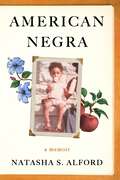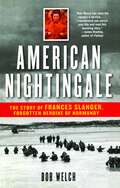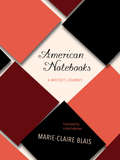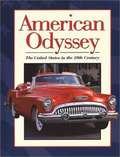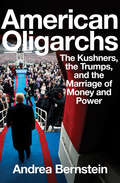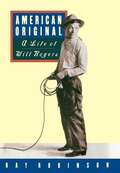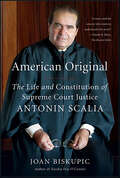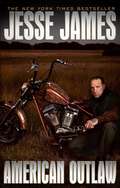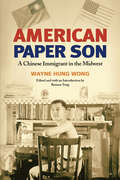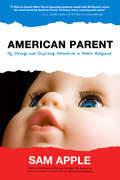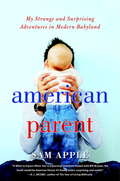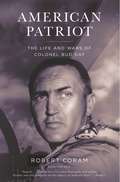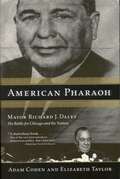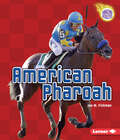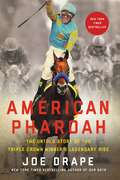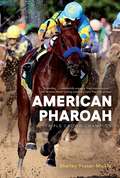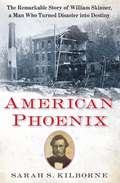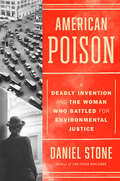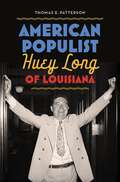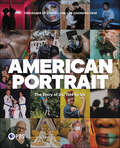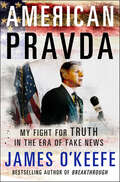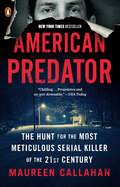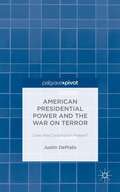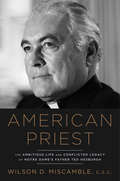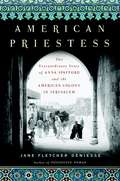- Table View
- List View
American Negra: A Memoir
by Natasha S. AlfordAward-winning journalist Natasha S. Alford grew up between two worlds as the daughter of an African American father and Puerto Rican mother. In American Negra, a narrative that is part memoir, part cultural analysis, Alford reflects on growing up in a working-class family from the city of Syracuse, NY.In smart, vivid prose, Alford illustrates the complexity of being multiethnic in Upstate New York and society’s flawed teachings about matters of identity. When she travels to Puerto Rico for the first time, she is the darkest in her family, and navigates shame for not speaking Spanish fluently. She visits African-American hair salons where she’s told that she has “good” hair, while internalizing images that as a Latina she has "bad” hair or pelo malo.When Alford goes from an underfunded public school system to Harvard University surrounded by privilege and pedigree, she wrestles with more than her own ethnic identity, as she is faced with imposter syndrome, a shocking medical diagnosis, and a struggle to define success on her own terms. A study abroad trip to the Dominican Republic changes her perspective on Afro-Latinidad and sets her on a path to better understand her own Latin roots.Alford then embarks on a whirlwind journey to find her authentic voice, taking her across the United States from a hedge fund boardroom to a classroom and ultimately a newsroom, as a journalist. A coming-of-age story about what it's like to live at the intersections of race, culture, gender, and class, all while staying true to yourself, American Negra is a captivating look at one woman’s experience being Negra in the United States. As the movement to highlight Afro-Latin identity and overlooked histories of the African diaspora grows, American Negra illustrates the diversity of the Black experience in the larger fabric of American society.
American Nightingale: The Story of Frances Slanger, Forgotten Heroine of Normandy
by Bob WelchOf the 350,000 American women in uniform during World War II, none instilled more hope in American GIs than Frances Slanger. In Army fatigues and helmet she splashed ashore with the first nurses to hit the Normandy beach in June 1944. Later, from a storm-whipped tent amid the thud of artillery shells, she wrote a letter to Stars and Stripes newspaper that would stir the souls of thousands of weary soldiers. Hundreds wrote heartfelt responses, praising Slanger and her fellow nurses and honoring her humility and patriotism. But Frances Slanger never got to read such praise. She was dead, killed the very next day when German troops shelled her field hospital, the first American nurse to die in Europe after the landing at Normandy. Frances Slanger was a Jewish fruit-peddler's daughter who survived a chilling childhood in World War I-torn Poland and immigrated to America at age seven. Inspired by memories of her bitter past and a Nazi-threatened future, she defied her parents' wishes by becoming a nurse and joining the military. A woman of great integrity and courage, she was also a passionate writer and keeper of chapbooks. This is the story of her too brief life.
American Notebooks: A Writer's Journey
by Marie-Claire BlaisIt is the spring of 1963. The young Quebec author Marie-Claire Blais, bursting with energy and talent, has just won a coveted Guggenheim fellowship. She chooses Cambridge, Massachusetts, as the place where she will begin her writer's apprenticeship with her mentor, Edmund Wilson. American Notebooks is much more than a fascinating autobiographical account of the intellectual flowering of a great writer. An album of exquisitely drawn literary portraits of companions, intellectuals, writers, musicians, artists and social activists of the period--Edmund and Elena Wilson; Mary Meigs; Maud Maugan; Barbara Deming; Truman Capote; Jacques Hébert, her first Quebec publisher, then senator; and many others--it also introduces many of the real life personalities who have inspired her fictional characters.
American Odyssey: The United States In The 20th Century
by Gary B. NashThe Americas had long been the home to a rich variety of Native American cultures. Hundreds of years ago, however, other peoples-- Europeans and enslaved Africans--set foot in what was to them a new world. Together they created the United States of America--a nation founded on the promise of liberty and equality for all the diverse people who have contributed to its success.
American Oligarchs: The Kushners, The Trumps, And The Marriage Of Money And Power
by Andrea BernsteinA multigenerational saga of two families, who rose from immigrant roots to the pinnacle of wealth and power, that tracks the unraveling of American democracy. <P><P>In American Oligarchs, award-winning investigative journalist Andrea Bernstein tells the story of the Trump and Kushner families like never before. Their journey to the White House is a story of survival and loss, crime and betrayal, that stretches from the Klondike Gold Rush, through Nazi-occupied Poland and across the American Century, to our new gilded age. In building and maintaining their dynastic wealth, these families came to embody the rising nationalism and inequality that has pushed the United States to the brink of oligarchy. <P><P>Building on her landmark reporting for the acclaimed podcast Trump, Inc. and The New Yorker, Bernstein’s painstaking detective work brings to light new information about the families’ arrival as immigrants to America, their paths to success, and the business and personal lives of the president and his closest family members. <P><P>Bernstein traces how the two families ruthlessly harnessed New York and New Jersey machine politics to gain valuable tax breaks and grew rich on federal programs that bolstered the middle class. She shows how the Trump Organization, denied credit by American banks, turned to shady international capital. She reveals astonishing new details about Charles Kushner’s attempts to ensnare his brother-in-law with a prostitute and explores how Jared Kushner and his father used a venerable New York newspaper to bolster their business empire. <P><P>Drawing on more than two hundred interviews and more than one hundred thousand pages of documents, many previously unseen or long forgotten, Bernstein shows how the Trumps and the Kushners repeatedly broke rules and then leveraged secrecy, intimidation, and prosecutorial and judicial power to avoid legal consequences. <P><P>The result is a compelling narrative that details how the Trump and Kushner dynasties encouraged and profited from a system of corruption, dark money, and influence trading, and that reveals the historical turning points and decisions—on taxation, regulation, white-collar crime, and campaign finance laws—that have brought us to where we are today. <P><P><b>A New York Times Bestseller</b>
American Original: A Life Of Will Rogers
by Ray RobinsonA biography of Will Rogers, an early twentieth century humorist, newspaper columnist, actor in silent movies and then talkies and a spectacular lariat performer, who was very proud of his one-quarter Cherokee ancestry. Definitely an American original because of the combination of his folksy language and wry humor.
American Original: The Life and Constitution of Supreme Court Justice Antonin Scalia
by Joan BiskupicThe first full-scale biography of the Supreme Court's most provocative—and influential—justiceIf the U.S. Supreme Court teaches us anything, it is that almost everything is open to interpretation. Almost. But what's inarguable is that, while the Court has witnessed a succession of larger-than-life jurists in its two-hundred-year-plus history, it has never seen the likes of Supreme Court Justice Antonin Scalia. Combative yet captivating, infuriating yet charming, the outspoken jurist remains a source of curiosity to observers across the political spectrum and on both sides of the ideological divide. And after nearly a quarter century on the bench, Scalia may be at the apex of his power. Agree with him or not, Scalia is "the justice who has had the most important impact over the years on how we think and talk about the law," as the Harvard law dean Elena Kagan, now U.S. Solicitor General, once put it. Scalia electrifies audiences: to hear him speak is to remember him; to read his writing is to find his phrases permanently affixed in one's mind. But for all his public grandstanding, Scalia has managed to elude biographers—until now. In American Original: The Life and Constitution of Supreme Court Justice Antonin Scalia, the veteran Washington journalist Joan Biskupic presents for the first time a detailed portrait of this complicated figure and provides a comprehensive narrative that will engage Scalia's adherents and critics alike. Drawing on her long tenure covering the Court, and on unprecedented access to the justice, Biskupic delves into the circumstances of his rise and the formation of his rigorous approach to the bench. Beginning with the influence of Scalia's childhood in a first-generation Italian American home, American Original takes us through his formative years, his role in the Nixon-Ford administrations, and his trajectory through the Reagan revolution. Biskupic's careful reporting culminates with the tumult of the contemporary Supreme Court—where it was and where it's going, with Scalia helping to lead the charge.Even as Democrats control the current executive and legislative branches, the judicial branch remains rooted in conservatism. President Obama will likely appoint several new justices to the Court—but it could be years before those appointees change the tenor of the law. With his keen mind, authoritarian bent, and contentious rhetorical style, Scalia is a distinct and persuasive presence, and his tenure is far from over. This new book shows us the man in power: his world, his journey, and the far-reaching consequences of the transformed legal landscape.
American Outlaw
by Jesse JamesThe New York Times bestselling self-portrait of a flawed but determined everyman: rebel, outlaw, gearhead, artist, entrepreneur, lost son, and fiercely committed father Jesse James is everything you imagined him to be-- and more than you ever expected. He has led a violent life. He's survived lower depths, faced harder times, and beaten down more private demons than most--and lived to tell his story with honesty, introspection, and humility. He's tough as nails and riding hard through life, with plenty of wisdom to share about taking a hit and coming back up. In American Outlaw, Jesse reveals all: from his volatile upbringing and troubled relationship with his father to his wild days of car thieving and juvenile detention; from knocking heads as a rock 'n' roll bodyguard to his destructive drinking and barroom brawling; from building an empire from the ground up to marriages marked with both happiness and gut-wrenching pain; from living inside the hottest level of paparazzi hell to rehab and making peace with his past.
American Paper Son: A Chinese Immigrant in the Midwest (Asian American Experience)
by Wayne Hung WongIn the early and mid-twentieth century, Chinese migrants evaded draconian anti-immigrant laws by entering the US under false papers that identified them as the sons of people who had returned to China to marry. Wayne Hung Wong tells the story of his life after emigrating to Wichita, Kansas, as a thirteen-year-old paper son. After working in his father’s restaurant as a teen, Wong served in an all-Chinese Air Force unit stationed in China during World War II. His account traces the impact of race and segregation on his service experience and follows his postwar life from finding a wife in Taishan through his involvement in the government’s amnesty program for Chinese immigrants and career in real estate. Throughout, Wong describes the realities of life as part of a small Chinese American community in a midwestern town. Vivid and rich with poignant insights, American Paper Son explores twentieth-century Asian American history through one person’s experiences.
American Parent
by Sam ApplePart memoir, part journalism, part history, part downright strange and hilarious, American Parent takes readers on a unique tour of the world of new mothers and fathers. As Sam Apple embarks on his own journey into parenthood, he decides to put his background in journalism to good use by talking to a wide range of experts. Along the way, Apple visits with the mohel who circumcised him, enters a trance with a childbirth hypnotist, goes on a stakeout with a nanny spy, and attends a lecture on Botox for new mothers. Apple is full of questions, and none is left unexplored: Is the Lamaze method a Stalinist plot? (Yes.) Are newborns really fetuses that are born too soon? (Sort of.) Is there a universal theory that can explain the origins of circumcision in many diverse cultures? (Maybe.) Does it sting when you pour baby shampoo into your own eyes? (Big-time!)And yet for all the unusual twists in this story--at one point Apple fantasizes about a father losing his mind and refusing to remove his BabyBjörn--the strangest twist of all might be that at its core American Parent is a deeply serious and personal book about the way emotionally vulnerable and confused new parents can get lost in the increasingly complex labyrinth of baby products, classes, and fads.
American Parent: My Strange and Surprising Adventures in Modern Babyland
by Sam ApplePart memoir, part journalism, part history, part downright strange and hilarious, American Parent takes readers on a unique tour of the world of new mothers and fathers. As Sam Apple embarks on his own journey into parenthood, he decides to put his background in journalism to good use by talking to a wide range of experts. Along the way, Apple visits with the mohel who circumcised him, enters a trance with a childbirth hypnotist, goes on a stakeout with a nanny spy, and attends a lecture on Botox for new mothers. Apple is full of questions, and none is left unexplored: Is the Lamaze method a Stalinist plot? (Yes.) Are newborns really fetuses that are born too soon? (Sort of.) Is there a universal theory that can explain the origins of circumcision in many diverse cultures? (Maybe.) Does it sting when you pour baby shampoo into your own eyes? (Big–time!) And yet for all the unusual twists in this story—at one point Apple fantasizes about a father losing his mind and refusing to remove his BabyBjörn—the strangest twist of all might be that at its core American Parent is a deeply serious and personal book about the way emotionally vulnerable and confused new parents can get lost in the increasingly complex labyrinth of baby products, classes, and fads.
American Patriot: The Life and Wars of Colonel Bud Day
by Robert CoramDuring the course of his military career, Bud Day won every available combat medal, escaped death on no less than seven occasions, and spent 67 months as a POW in the infamous Hanoi Hilton, along with John McCain. Despite sustained torture, Day would not break. He became a hero to POWs everywhere--a man who fought without pause, not a prisoner of war, but a prisoner at war. Upon his return, passed over for promotion to Brigadier General, Day retired. But years later, with his children grown and a lifetime of service to his country behind him, he would engage in another battle, this one against an opponent he never had expected: his own country. On his side would be the hundreds of thousands of veterans who had fought for America only to be betrayed. And what would happen next would make Bud Day an even greater legend.
American Pharaoh: His Battle for Chicago and the Nation
by Elizabeth Taylor Adam CohenYou might say it took a village to raise this child. Richard Daley and Chicago are inseparable, and it's impossible to discuss one without at least mentioning the other. Consequently, American Pharaoh includes far more material than your average biography; this is as much the story of the city as it is of the man. Covering the years between 1902 and 1976 (that is, between Daley's birth and death), authors Adam Cohen and Elizabeth Taylor show us a life that in some ways symbolizes the American dream: a boy from a poor neighborhood grows up to wield unimaginable power, yet never forgets his roots. But Daley's was a complicated legacy. While filling Chicago with modern architecture and affecting national politics, he was also held responsible for the segregation and police brutality that tore the city apart during the late '60s and early '70s. Throughout the book, Cohen and Taylor remind readers that Daley's real influence came from the powerful political machine he created. When he didn't like guidelines from national agencies, for example, he went directly to the presidents he helped get elected. When he got bad local press, people lost their jobs and his neighbors marched in his support. When Martin Luther King Jr. came to town, he was greeted by a handpicked organization of African American leaders with strong ties to Daley's machine. It's startling to remember that this was simply a local office; the mayor's loyalties and prejudices affected the entire country. American Pharaoh shows politics at its deepest level, and each chapter brings new insights into a complex man and the system he created in order to rule the city that made him. --Jill Lightner
American Pharoah (Amazing Athletes Ser.)
by Jon M FishmanIn 2015, racehorse American Pharoah won the Kentucky Derby, the Preakness Stakes, and finally the Belmont Stakes to become the first Triple Crown winner since 1978. The three-year-old horse with the misspelled name thrilled racing fans with his powerful and graceful running. As the 12th Triple Crown winner in history and the first in 37 years, American Pharoah joined an elite group of champions. Read all about the life of a legendary racehorse.
American Pharoah: The Untold Story of the Triple Crown Winner's Legendary Rise
by Joe DrapeHistory was made at the 2015 Belmont Stakes when American Pharoah won the Triple Crown, the first since Affirmed in 1978. As magnificent as the champion is, the team behind him has been all too human while on the road to immortality.Written by an award-winning New York Times sportswriter, American Pharoah is the definitive account not only of how the ethereal colt won the Kentucky Derby, Preakness, and Belmont Stakes, but how he changed lives. Through extensive interviews, Drape explores the making of an exceptional racehorse, chronicling key events en route to history. Covering everything from the flamboyant owner's successful track record, the jockey's earlier heartbreaking losses, and the Hall of Fame trainer's intensity, Drape paints a stirring portrait of a horse for the ages and the people around him.
American Pharoah: Triple Crown Champion
by Shelley Fraser MickleFrom the author of Barbaro comes the triumphant story of the 2015 Triple Crown and Breeders Cup winner, American Pharoah.When American Pharoah won the American Triple Crown and the Breeders’ Cup Classic in 2015 he became the first horse to win the “Grand Slam” of American horse racing, by winning all four races. His story captured American’s imagination, and this inspired account will also feature the handlers who saw his promise: owner, Ahmed Zayat of Zayat Stables, trainer Bob Baffert, and jockey Victor Espinoza. With American Pharoah, Shelley Mickle tells the story of this beloved horse’s life from birth to his historic achievement of becoming the twelfth Triple Crown winner.
American Phoenix
by Sarah S. KilborneThe incredible story of nineteenth-century millionaire William Skinner, a leading founder of the American silk industry, who lost everything in a devastating flood--and his improbable, inspiring comeback to the pinnacle of the business world In 1845 a young, penniless William Skinner sailed in steerage class on a boat that took him from the slums of London to the United States. Endowed with rare knowledge in the art of dyeing and an uncanny business sense, he acquired work in a fledgling silk mill in Massachusetts, quickly rising to prominence in the nation's new luxury industry. Soon he opened his own factory and began turning out one of the bestselling silk brands in the country. Skinner was lauded as a pioneer in the textile industry and a manufacturer who knew no such word as fail. His business grew to sustain a bustling community filled with men, women, and children, living and working in the mill village of "Skinner-ville," producing the country's most glamorous, fashionable thread. Then, in 1874, disaster struck. Hundreds of millions of gallons of water burst through a nearby dam, destroying everything in its path, including Skinnerville. Within fifteen minutes, Skinner's entire life's work was swept away, and he found himself one of the central figures in the worst industrial disaster the nation had yet known. In this gripping narrative history, Skinner's great-great-granddaughter, Sarah S. Kilborne, tells an inspiring, unforgettable American story--of a town devastated by unimaginable catastrophe; an industry that had no reason to succeed except for the perseverance of a few intrepid entrepreneurs; and a man who had nothing--and everything--to lose as he struggled to rebuild his life a second time. None of Skinner's peers who lost their factories in the Mill River Flood withstood the shock of their losses, but Skinner went on to stage one of the greatest comebacks in the annals of American industry. As a result of his efforts to survive, he became one of the leading silk manufacturers in the world, leaving an indelible imprint on the history of American fashion and style. More striking still, this achievement would never have been possible if Skinner hadn't been ruined by the flood and forced, at age forty-nine, to start all over again, rebuilding everything with just one asset: the knowledge in his head. With masterful skill Kilborne brings to life an era when fabric was fashion, silk was supreme, factories were beacons of American success, and immigrants like Skinner with the secrets of age-old European arts possessed knowledge worth gold to Americans. Here is a story of ambition and desire, resilience and faith, disaster and survival. It is about making it, losing it, and then making it again despite the odds. An enthralling tale, American Phoenix offers a new twist on the American dream, reminding us that just when we thought the dream was over, it may have only just begun. *** FROM AMERICAN PHOENIX As the train slowed in its approach to the depot at the northern end of Skinnerville, one of Skinner's employees, John Ellsworth perhaps, awaited him on the platform. The depot was about a quarter mile from the house along a dark, unlit road. Thus when Skinner stepped down from the car and into the cold night air, he would have found both driver and horse all ready for the short jog home. The trip and this day were almost over, the anniversaries behind him, and a new year in the life of his marriage, his family, and his work was about to begin on the morrow. He was forty-nine years old, and the fabric of his existence had never been stronger. As he walked up the steps to his front door, there in the middle of Skinnerville, with the river flowing reliably behind him, the mill at rest across the way, the houses of his neighbors and employees all around, and a reunion with his wife and children just seconds ahead, there wasn't one clue, nor any sign, that the very next morning nearly everything in his world would be swept away.
American Poison: A Deadly Invention and the Woman Who Battled for Environmental Justice
by Daniel StoneFrom the national bestselling author of The Food Explorer comes the untold story of Alice Hamilton, a trailblazing doctor and public health activist who took on the booming auto industry—and the deadly invention of leaded gasoline, which would poison millions of people across America. At noon on October 27, 1924, a factory worker was admitted to a hospital in New York City, suffering from hallucinations and convulsions. Before breakfast the next day, he was dead. Alice Hamilton was determined to prevent such a tragedy from happening again. By the time of the accident, Hamilton had pioneered the field of industrial medicine in the United States. She specialized in workplace safety years before the Occupational Safety and Health Administration was created. She was the first female professor at Harvard. She spent decades inspecting factories and mines. But this time, she was up against a formidable new foe: America&’s relentless push for progress, regardless of the cost. The 1920s were an exciting decade. Industry was booming. Labor was flourishing. Automobiles were changing roads, cities, and nearly all parts of American life. And one day, an ambitious scientist named Thomas Midgley Jr. triumphantly found just the right chemical to ensure that this boom would continue. His discovery—tetraethyl leaded gasoline—set him up for great wealth and the sort of fame that would land his name in history books. Soon, Hamilton would be on a collision course with Midgley, fighting full force against his invention, which poisoned the air we breathe, the water we drink, and the basic structure of our brains. American Poison is the gripping story of Hamilton&’s unsung battle for a healthy planet—and the ramifications that continue to echo today.
American Populist: Huey Long of Louisiana
by Thomas E. PattersonThomas E. Patterson’s monumental biography of Huey Long is a profound reevaluation of his life and legacy, recognizing him as an inspirational progressive thinker, populist hero, and radical influence on the New Deal before an assassin’s bullet ended his life in 1935. First as governor and then as U.S. senator, Long transformed the politics of Louisiana by standing for the interests of citizens whom state officials had historically ignored. He eased suffrage restrictions so that more people could vote, and voters endorsed his program of more robust government services and shifting the tax burden to those better able to pay. In the United States Senate, during the darkest days of the Great Depression, he advocated loudly and ceaselessly for the redistribution of wealth, expanding public works, increasing the money supply, insuring bank deposits, paying old-age pensions and veterans’ benefits, delivering a minimum income for families, and funding college and vocational education. President Franklin D. Roosevelt, along with other politicians and pundits, dismissed Long’s proposals as nonsense put forth by a reckless demagogue in search of votes. Despite several biographies, acclaimed novels, and historical studies in the years since Long’s death, his reputation today is mostly caricature: a spellbinding speaker, a dictator, a populist firebrand who was unprincipled and corrupt. Using previously untapped personal papers of Long and his son Russell, other primary sources, recent scholarship, and his experience as a lawyer, Patterson provides a necessary corrective as he analyzes the contours of Long’s career, deconstructs the elements of his success, undercuts several myths related to his time in office, and explains the circumstances that led to his ultimate downfall. The result is the most comprehensive, balanced, and analytical study of the Kingfish to date.
American Portrait: The Story of Us, Told by Us
by PBSBased on the popular and revolutionary PBS multiplatform documentary project, an inspiring and striking photographic portrait that brilliantly captures the tumultuous, historic year that was 2020, offering an intimate look at the heart and soul of our national life and what it means to be an American today, revealed through the stories of ordinary people from sea to shining sea.Everyone has a story . . . In January 2020, in celebration of its 50th anniversary, PBS launched an ambitious national storytelling project, American Portrait, inviting people across the country to participate in a national conversation about what it means to be an American today. The multiplatform experience, including a television series that will air on PBS stations nationwide in January 2021, has created a communal voice through the individual stories of participants—each one a unique stitch in the beautiful, diverse quilt that is America. A vivid yet nuanced snapshot of who we are, this visually striking companion volume features more than 400 entries and photographs, all which began with an answer to a simple cue: My American story started when . . .You don’t know what it’s like to . . .My greatest challenge is . . . The tradition I carry on is . . . I was raised to believe . . . What keeps me up at night is . . .I took a risk when . . .When I step outside my door . . . Most days I feel . . . Told by people of all ages, orientations, and walks of life, these unique stories of joy, adversity, love, sacrifice, grief, sharing, triumph, and grace, centered on the themes of family, work, fun, faith, and community, illuminate the struggles, hopes, dreams, and convictions of Americans today. The more we share with our fellow citizens, the more we can see a real, complex, and fascinating representation of our country that is far richer and deeper than headlines and elections tell us. As intriguing, thoughtful, and distinct as the nation it embodies, American Portrait is a photographic manifestation of Walt Whitman’s immortal words, “I am large. I contain multitudes”—and a vital and ultimately hopeful reminder that what we all share is much greater and enduring than what may divide us.
American Pravda: My Fight for Truth in the Era of Fake News
by James O'KeefeThe one real difference between the American press and the Soviet state newspaper Pravda was that the Russian people knew they were being lied to. To expose the lies our media tell us today, controversial journalist James O’Keefe created Project Veritas, an independent news organization whose reporters go where traditional journalists dare not. Their investigative work–equal parts James Bond, Mike Wallace, and Saul Alinsky—has had a consistent and powerful impact on its targets.In American Pravda, the reader is invited to go undercover with these intrepid journalists as they infiltrate political campaigns, unmask dishonest officials and expose voter fraud. A rollicking adventure story on one level, the book also serves as a treatise on modern media, arguing that establishment journalists have a vested interest in keeping the powerful comfortable and the people misinformed.The book not only contests the false narratives frequently put forth by corporate media, it documents the consequences of telling the truth in a world that does not necessarily want to hear it. O’Keefe’s enemies attack with lawsuits, smear campaigns, political prosecutions, and false charges in an effort to shut down Project Veritas. For O’Keefe, every one of these attacks is a sign of success.American Pravda puts the myths and misconceptions surrounding O’Keefe’s activities to rest and will make you rethink every word you hear and read in the so-called mainstream press.
American Predator: The Hunt for the Most Meticulous Serial Killer of the 21st Century
by Maureen CallahanA Los Angeles Times "Seven Highly Anticipated Books for Summer Reading"A USA Today "20 of the Season's Hottest New Books"A New York Post "25 Best Beach Reads of 2019 You Need to Pre-Order Now" "Maureen Callahan's deft reporting and stylish writing have created one of the all-time-great serial-killer books: sensitive, chilling, and completely impossible to put down." --Ada Calhoun, author of St. Marks Is Dead Ted Bundy. John Wayne Gacy. Jeffrey Dahmer. The names of notorious serial killers are usually well-known; they echo in the news and in public consciousness. But most people have never heard of Israel Keyes, one of the most ambitious and terrifying serial killers in modern history. The FBI considered his behavior unprecedented. Described by a prosecutor as "a force of pure evil," Keyes was a predator who struck all over the United States. He buried "kill kits"--cash, weapons, and body-disposal tools--in remote locations across the country. Over the course of fourteen years, Keyes would fly to a city, rent a car, and drive thousands of miles in order to use his kits. He would break into a stranger's house, abduct his victims in broad daylight, and kill and dispose of them in mere hours. And then he would return home to Alaska, resuming life as a quiet, reliable construction worker devoted to his only daughter.When journalist Maureen Callahan first heard about Israel Keyes in 2012, she was captivated by how a killer of this magnitude could go undetected by law enforcement for over a decade. And so began a project that consumed her for the next several years--uncovering the true story behind how the FBI ultimately caught Israel Keyes, and trying to understand what it means for a killer like Keyes to exist. A killer who left a path of monstrous, randomly committed crimes in his wake--many of which remain unsolved to this day.American Predator is the ambitious culmination of years of interviews with key figures in law enforcement and in Keyes's life, and research uncovered from classified FBI files. Callahan takes us on a journey into the chilling, nightmarish mind of a relentless killer, and to the limitations of traditional law enforcement.
American Presidential Power and the War on Terror: Does The Constitution Matter?
by Justin DePlatoThis book examines the use of presidential power during the War on Terror. Justin DePlato joins the debate on whether the Constitution matters in determining how each branch of the federal government should use its power to combat the War on Terror. The actions and words of Presidents George W. Bush and Barack Obama are examined. DePlato's findings support the theory that executives use their own prerogative in determining what emergency powers are and how to use them. According to DePlato, the Presidents argue that their powers are implied in Article II of the Constitution, not expressed. This conclusion renders the Constitution meaningless in times of crisis. The author reveals that Presidents are becoming increasingly cavalier and that the nation should consider adopting an amendment to the Constitution to proffer expressed executive emergency powers.
American Priest: The Ambitious Life and Conflicted Legacy of Notre Dame's Father Ted Hesburgh
by Wilson D. MiscambleA provocative new biography probes deeply into the storied life of Father Ted Hesburgh, the well-loved but often controversial president of Notre Dame University. Considered for many decades to be the most influential priest in America, Rev. Theodore M. Hesburgh, played what many consider pivotal roles in higher education, the Catholic Church, and national and international affairs. American Priest examines his life and his many and varied engagements—from the university he led for thirty-five years to his associations with the Vatican and the White House—and evaluates the extent and importance of his legacy. Author and Notre Dame priest-professor Wilson D. Miscamble tracks how Hesburgh transformed Catholic higher education in the postwar era and explores how he became a much-celebrated voice in America at large. Yet, beyond the hagiography that often surrounds Hesburgh’s legacy lies another more complex and challenging story. What exactly were his contributions to higher learning; what was his involvement in the civil rights movement; and what was the nature of his role as advisor to popes and presidents? Understanding Hesburgh’s life and work illuminates the journey that the Catholic Church traversed over the second half of the twentieth century. Exploring and evaluating Hesburgh’s importance, then, contributes not only to the colorful history of Notre Dame but also to comprehending the American Catholic experience.
American Priestess: The Extraordinary Story of Anna Spafford and the American Colony in Jerusalem
by Jane Fletcher GeniesseFor generations in Jerusalem, a fabled mansion has been the retreat for foreign correspondents, diplomats, pilgrims and spies but until now, few have known the true story of the house that became the American Colony Hotel or its bizarre history of tragedy, religious extremism, emotional blackmail, and peculiar sexual practices. During the boom years following the Civil War, in the country's heartland capital, Chicago, a prominent lawyer Horatio Spafford and his blue-eyed wife Anna rode the mighty wave of Protestant evangelicalism deluging the nation. When suddenly tragedy struck, the charismatic Spaffords, grieving, attracted followers eager to believe their prophecy that the Second Coming was at hand and in 1881 sailed with them to Jerusalem to see the Messiah alight on the Mount of Olives. No sooner had they settled into the Holy City than the U.S. Consul and the established Christian missionaries declared them heretics and whispered of sexual deviance. Yet Muslims and Jews admired their unflagging care of the sick and the needy, and Jews were intrigued with their advocacy of a Jewish Return to Zion. When Horatio died, Anna assumed leadership, shocking even her adherents by abolishing marriage and established a dictatorship that was not always benevolent. Ever dogged by controversy, she and her credulous followers lived through and closely participated in the titanic upheavals that eventually formed the modern Middle East. Written with flair and insight, American Priestess provides a fascinating exploration of the seductive power of evangelicalism and raises questions about the manipulation of religion to serve personal goals. A powerful narrative, the story sweeps through the dramatic collapse of the Ottoman Empire, the establishment of the British Mandate, and finally the founding of Israel where Anna's house in East Jerusalem, now the American Colony Hotel, stands as an exemplar of beauty and comfort, despite its turbulent history.
